Book review: Siege of Terra: The End and the Death: Volume III
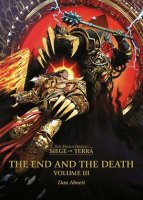
Book: Siege of Terra: The End and the Death: Volume III
And here we are, the third and last volume of the last book in the Siege of Terra series, which also represents the last book in The Horus Heresy series. Quite an ending, and most probably also the main reason why splitting in three the final arc of all "Warhammer 30,000" arcs.
As I expected, this title delivers way more of everything: more action, more events, more questions [1]... But we finally get all the myriad story arcs closed at once, some better than others; and, sadly, a few too dull/dry, after so many things have happened, to close certain plots in just a few paragraphs feels... unsatisfying.
But focusing on the main topic of the book, the battle between Horus and The Emperor delivers what you'd expect. It has many stages, and a few of them are a bit bizarre or not of my liking [2], but in general is energetic and exciting, with some twists here and there, despite the end being well known.
The writing is, as usual with Dan Abnett, very good, although I can now confirm that the three volumes contain too many synonyms and adjectives and at times excessively decorated sentences, that I grew tired of checking in the dictionary what some of them meant [3]. Using esoteric words to me does not make a book better, just more complex to read.
Despite the flaws, I'm happy with the read, I don't regret the purchases, and I recommend their reading for anyone wanting to get a vastly longer description of how the Horus Heresy finished.
[1] I don't want to spoil the contents, but certain actions leave questions unanswered (on purpose, of course)
[2] When they decide to play a kind of Magic: The Gathering with custom tarot card decks... 😬
[3] Funnily, My ebook reader's dictionary couldn't find a few of them.
Tags: Books
Book review: Siege of Terra: The End and the Death: Volume II
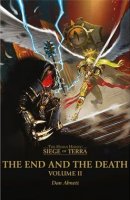
Book: Siege of Terra: The End and the Death: Volume II
I gave myself as a Christmas present the newly released volume 2 of The End and the Death, and just finished reading it. This will be a shorter review because, as I was fearing, there will be a third and final volume, so this middle book advances the story but, excepting two specific events, really not that much. I will only mention one of the exceptions because it is already known, the other is left for the book readers to find out.
With more than 500 pages, I feel that in this case we have an artificially elongated storyline. Yes, all the plots, subplots and minor things kind of progress, but for some of them it is so minimal, or so dull and uninteresting, that I stand firm on my opinion about some of them being redundant and better off. Also, in this book there are so many jumps between the groups of characters, that if each had a chapter we would be talking about probably more than a hundred! Some of the micro-chapters are just two or three pages long, which feels almost confusing, and transforms what could be cliffhangers into mere annoyances.
There are excellent chunks of content, like the Horus vs Sanguinius battle, which we all know how it ends, but still feels exciting at first and then sad (this book actually ends just after the moment that Horus kills the primarch). There are some very interesting reveals around the Emperor, some of which would be very cool to use in future campaigns or books. And I also enjoyed Ahriman, as it provides a view of a sorcerer thirsty for knowledge, instead of a classic "bad guy appears and kills all poor non-astartes humans".
Not a bad read, but I expected either to wrap up the story, or to provide enough quality content to make up for a third volume. And the book does not provide the first, and falls short on the second. I recommend to wait for the third title and then read them together.
Tags: Books
Book review: Dune Messiah
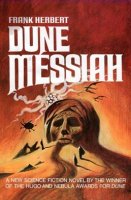
Book: Frank Herbert's Dune Messiah
The first Dune book got me even more interested in Frank Herbert's universe, so I had to keep reading. I recently finished the second physical title (according to the "internal" numeration, it would be the fourth book), so here comes a small review.
Again, the first half of the book was very slow-paced. There are many moving pieces, at times unclear exactly to what purpose, and very detailed conversations and explanations of the state of things (12 years have passed since the first book's events). But then, everything begins to connect; events, plots, and characters advance.
It is a different book, not a mere continuation. The main character, Paul, feels tormented by his foresight; his close friends doubt him, and people question his decisions or directly conspire against him. And some new characters are disturbing, specially the "gholas", clones of deceased humans with metallic eyes and reprogrammed memory (but recalling most of their past).
You won't find here the same positive and encouraging story of the rising of a hero against oppressors. But it gets fascinating, with a thrilling "last act" finishing with an ending that makes you want more.
Tags: Books
Book review: Dune
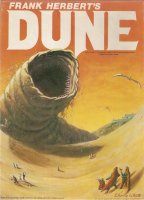
Book: Frank Herbert's Dune
Dune is a science fiction story set in a distant future where noble houses rule different planets, alongside an Emperor and his elite Sardaukar troops, and a powerful trading guild that controls space travel. The plot follows a young Paul Atreides and his family as they take charge of Arrakis, a desert planet that is the only source of a valuable substance called melange or 'spice'. The spice extends life and enhances mental abilities, and it is crucial for space travel. The Atreides arrive to Arrakis to control it by the Emperor's orders, but things won't be as easy. The story explores complex themes of politics, religion, ecology, technology, and human emotions as different factions in the empire clash over control of the planet and its invaluable spice.
Yet another timeless classic that I had pending and decided to go for. In this case, even more so because Dune 2 is one of my all time favourite videogames, so I felt I had a pending debt to settle. And I like both the old and new movies, so needed to see the source of it all.
I've enjoyed the book so much so as to plan to keep reading at least one more book (potentially until God Emperor of Dune, included). I knew it was good but didn't expected to hook me in so much. At times it felt like The Lord of The Rings, providing long and detailed descriptions of seemingly trivial characters, scenarios and details. Then, the "characters thinking" technique (you read what they think at times, not only what they say) is different and interesting, providing with additional details and more insight on how and why different characters act the way they do.
It is also different from what I expected: The scarce technology (the Ornithopters, meelee shields, spice harvesters, and some "laser weapons", but not much more) was a surprise to me; In the strategy videogame there are tons of vehicles, troops with different long range weapons, but in the book fuel is scarce and vehicles at times deteriorated, combats are mostly melee, and in general everything feels not as futuristic as you'd imagine. Reading at Wikipedia I saw that the author wanted to replicate a feudalism-like setting, much more focused on the human and politics side of things, and it is clearly there.
The only thing that I can complain about is that the pacing begins very slow, but speeds up and actually jumps ahead years by the end (few, but still), giving the sensation that you missed something in the middle. It is a long book, and yet I expected more things to happen in the kind of "final story arc", instead being a bit short. But maybe was just me wanting to read more about the intriguing Fremen, the Shai-hulud, and Arrakis itself.
A sci-fi must read.
Tags: Books
Book review: Siege of Terra: The End and the Death: Volume I
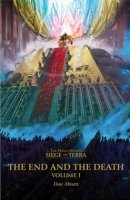
Book: Siege of Terra: The End and the Death: Volume I
The Horus Heresy Warhammer 40,000 novels have always been about expanding some basic lore concepts known since long: The Emperor created 20 space marine primarchs, the forces of Chaos spread them through the galaxy, The Emperor reunited them, at a certain point some, led by the favourite and warmaster primarch Horus Lupercal rebel, and although in the end are defeated, slain some loyal primarchs and leave the emperor heavily wounded and destined to sit forever in the golden throne.
After more than 50 books on the general story arc, Games Workshop/Black Library (their editorial wing) decided to elongate the money making machine a bit more, and divide the final confrontation (the Siege of Terra) in apparently another further 9 titles. Don't get me wrong, lore is the single best thing about the Warhammer 40k universe, but at times is clear the lore expansion is secondary to adding more volumes.
Although this novel is the 8th title on the Siege of Terra series, I wanted to begin with it because it's the most critical point: Loyalists are losing the war, the enemy is almost at the palace gates, reinforcements are not going to arrive in time, and the Emperor must do a final gambit to turn the tides: Go out and fight Horus.
So I'm probably missing a lot of context on some of the characters, and I indeed felt some of the side-stories felt a bit lacking information, so that's on me. But being a long book (more than 650 pages according to my eReader), and considering there will be a second volume (I sincerely hope they don't go too far and make it 3 parts), while reading I got the impression that there was a significant amount of fill content. The story advances, but at slow and very deliberate steps, also leaving you with a multi-faceted cliffhanger everywhere.
The writing is excellent, and having a lot of small chapters, each focusing on one of the characters or "groups" helps to keep clarity, but my impression was that it is intertwining, twisting together both three really important story lines (the Emperor, Malcador, and Horus) with lots of, at least for now, weird secondary quests and adventures, some of them a bit odd and even a tad silly.
Still, I think it's a good read, and combined with the remaining volume will become the new expanded lore about that truly important moment in the WH 40k universe. It could simply have contained the whole story in a single title.
Tags: Books
- ← Newer Articles Page 2 / 17 Older Articles →